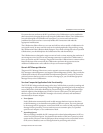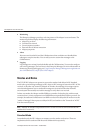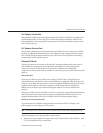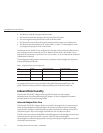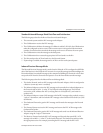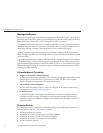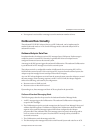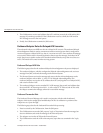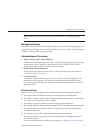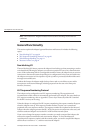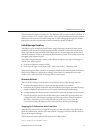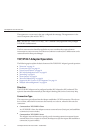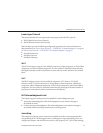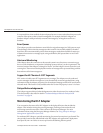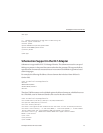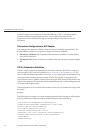
Note – For Delayed ACK, the Receiver and Forwarder must be on the same integration
server.
Message Verication
The only verication that the outbound Adapter does is to ensure that the message parses into
the generic Event Message Library, and that the MSH uses the correct elds. The acknowledge is
veried to ensure that the sent message is valid.
Acknowledgment Processing
■
Adapter Generates HL7 Acknowledgment
In this scenario, the Adapter generates an HL7 ACK after receiving and successfully storing
the message in a queue; otherwise, it generates an HL7 NAK. The HL7 ACK or NAK is
placed in the proper envelope and sent to the external system.
■
ESB Sends HL7 Acknowledgement
In this scenario, the Adapter acts as a sender in a Delayed ACK scenario, as described in
“Delayed ACK Mode” on page 13.
■
Canned HL7 NAK
A Canned HL7 NAK is created when a read error occurs, or when an message cannot be
identied as an HL7 message. The initial test ensures that the message conforms to the
lower-layer protocol. The Resource Adapter uses the MSH section parameters to create an
appropriate NAK.
Recourse Actions
Recourse actions can be congured for the outbound Adapter for the following conditions:
■
The Adapter sends the maximum number of canned negative acknowledgments.
■
The Adapter attempts to read data the maximum number of times from the external system
after a read or receive operation returns nothing.
■
The Adapter receives the maximum number of negative acknowledgments.
■
HL7 message validation fails prior to the sending of the HL7 message to the external system.
■
The Adapter reaches the maximum number of response timeouts while waiting for data
from the external system.
■
The Adapter receives an HL7 Application NAK from the external system.
■
The Adapter waits for a response from the external system for the congured amount of
time (in milliseconds).
For more information on the available recourse actions, see
“Recourse Actions” on page 21.
SunAdapterforTCP/IPHL7Overview
SunAdapterforTCP/IPHL7User's Guide 19



